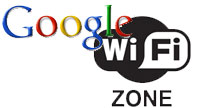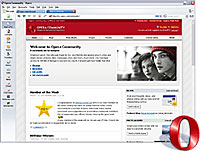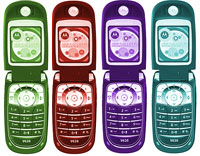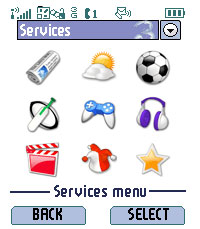 Neat Idea!
Neat Idea!
A UK student has thought up a unique way of financing his way through university: Selling online advertising space. That on its own isn’t unique, but the twist he has applied to it is: He is selling it by the pixel on his “Million Dollar Homepage”.
This guy is getting so much media attention as a result of the novelty value of his site that a lot of companies are getting interested in buying pixels from him. The going rate is $1/pixel, and there are 1,000,000 up for grabs… I wonder if he can make it to a million bucks?
This revenue concept started me thinking about what I could do to finance my way through University… I have just under 3 years to come up with something, and it better be good! It seems that finding a niche in the market for something unique and not actually that useful, and then attracting a load of media attention to give it artificial value is a good way of making cash on the Internet. Look out for me following suit in a few year’s time!
 They’ve done it again
They’ve done it again
Done what? I hear you ask. Google have launched a Beta version of their Wi-Fi service following a host of rumours since an article mentioning a possible Google Wi-Fi appeared in Business 2.0 back in August.
The service is only available in selected parts of San Francisco Bay (well two locations) for now, but knowing Google I am sure that it will spread relatively quickly.
Part of the evidence is a new product, for free download, that basically works as a VPN client and encrypts all data sent over the Google Wi-Fi hotspots to secure it. Only downside with this is that this application could cause privacy concerns, as Google will apparently record data about people’s Web-browsing habits. Still, it has to be paid for somehow and recording the sites people visit fits in with their analysis of the Web so as to aid its online advertising business, Ad-sense. A link to Google’s FAQ about their Secure Access product can be found here.
From the point of view of a teenager like me, this sort of service is very good: I don’t personally mind giving up a small amount of my privacy to be able to use a service that I could no way afford if it wasn’t free. Hell, at 16 I’m not even legally allowed a credit card with which to pay for commercial Wi-Fi services!
As regular readers, Mike caught this story earlier on in the week.
 It’s like the Middle Ages all over again!
It’s like the Middle Ages all over again!
This story is quite apt as I am currently suffering from the current real-life equivalent of the virtual plague documented by The Register. Yes, that’s right, I’ve caught the flu :-(
Anyway, according to The Register, World of Warcraft, a popular massively multiplayer online role playing game (MMORPG), has been hit by a plague. Blizzard, the company behind the hugely succesful game, introduced a new god character to their game called Hakkar. What’s special about him is that he carries some sort of disease, similar to HIV, that spreads to some of the people that he attacks. These people then spread the disease further and further, which has resulted in a large quantity of the World of Warcraft servers becoming infected by it.
It’s a new concept and just brings us even closer to where we start blurring the line between reality and virtual reality. It also shows that virtual reality can have all the nasties that the real world does too.
Anyway, I am off to bed, forget World of Warcraft, I’m ill and need to go to school tomorrow. Just hope I don’t spread the “plague”>
 BT has today set-up a new division, known as OpenReach. They’ve been under pressure from some time from competitors and regulators to curb their monopolistic tendencies (they still own over 85% if the infrastructure in the UK). There has even been talk of splitting BT up – although OfCom has currently reject this.
BT has today set-up a new division, known as OpenReach. They’ve been under pressure from some time from competitors and regulators to curb their monopolistic tendencies (they still own over 85% if the infrastructure in the UK). There has even been talk of splitting BT up – although OfCom has currently reject this. Following their free-for-24-hour offer at the end of August, Opera Software has permanently removed the ad banner and licensing fee from its award-winning Web browser.
Following their free-for-24-hour offer at the end of August, Opera Software has permanently removed the ad banner and licensing fee from its award-winning Web browser. Previously, Opera was only available free if users were prepared to put up with a distracting ad banner stuck on the top of the browser interface, with the option to shell out for a $39 (£21.60, €32) licensing fee to remove the thing and receive premium support.
Previously, Opera was only available free if users were prepared to put up with a distracting ad banner stuck on the top of the browser interface, with the option to shell out for a $39 (£21.60, €32) licensing fee to remove the thing and receive premium support. It seems a bit of a gamble to us – both IE and Firefox are also available free of charge and without a huge marketing campaign we can’t see how they’re going to get enough users to switch from their far better known rival products.
It seems a bit of a gamble to us – both IE and Firefox are also available free of charge and without a huge marketing campaign we can’t see how they’re going to get enough users to switch from their far better known rival products. There are now more than 2 billion mobile phone subscribers in the world, according to a report by Wireless Intelligence, a collaboration between analyst house Ovum and the GSM Association.
There are now more than 2 billion mobile phone subscribers in the world, according to a report by Wireless Intelligence, a collaboration between analyst house Ovum and the GSM Association. Not surprisingly, the bulk of the growth is happening from large, less well-developed markets such as China, India, Eastern Europe, Latin America and Africa.
Not surprisingly, the bulk of the growth is happening from large, less well-developed markets such as China, India, Eastern Europe, Latin America and Africa. Yo! Yo! Yo! Word! The Associated Press are getting hip and launching a news service for da yoot. Wicked, innit?!
Yo! Yo! Yo! Word! The Associated Press are getting hip and launching a news service for da yoot. Wicked, innit?! So far, more than 100 newspapers have signed up for asap, with the option to use the content for their online editions, print editions or both.
So far, more than 100 newspapers have signed up for asap, with the option to use the content for their online editions, print editions or both. It’s funny, laugh!
It’s funny, laugh! Ew… That’s not nice!
Ew… That’s not nice! Flogging a dead horse… Literally
Flogging a dead horse… Literally This regional order has been determined by a technical criteria determined by the broadcasters and Ofcom. The regional order will follow ITV regions. This ensures that the impact on ITV regional advertising markets is minimised.
This regional order has been determined by a technical criteria determined by the broadcasters and Ofcom. The regional order will follow ITV regions. This ensures that the impact on ITV regional advertising markets is minimised. Comment – It is interesting that London will be switched in 2012. Same year as we host the Olympics.
Comment – It is interesting that London will be switched in 2012. Same year as we host the Olympics. The Economist is a publication that we regard highly. It’s not for nothing that they gained a strong reputation. Sadly a recent piece on the Digital Home let them down.
The Economist is a publication that we regard highly. It’s not for nothing that they gained a strong reputation. Sadly a recent piece on the Digital Home let them down. This was repeated with halls and halls of identikit stands. Remove the brand names and it would have been a challenge to tell them apart.
This was repeated with halls and halls of identikit stands. Remove the brand names and it would have been a challenge to tell them apart. Where The Economist got it wrong #2 – MSMedia Centre PCs are a failure
Where The Economist got it wrong #2 – MSMedia Centre PCs are a failure Mobile network 3 has announced two new content packages aimed at getting more customers logging on to its mobile Internet services.
Mobile network 3 has announced two new content packages aimed at getting more customers logging on to its mobile Internet services. The network asserts that this limitation is to ensure that customers “can be sure that both front pages and sub-pages are viewable, that the speed of download is high and that all the site’s key activities are available”.
The network asserts that this limitation is to ensure that customers “can be sure that both front pages and sub-pages are viewable, that the speed of download is high and that all the site’s key activities are available”.